Do Cucumber Plants Like Tomato Feed? Exploring Best Fertilizer Options
If you’re wondering whether your cucumber plants will thrive on tomato feed, you’ve come to the right place. In the world of gardening, knowing the right type of fertilizer for your vegetable garden can make a huge difference. Yes, cucumber plants can benefit from tomato feed, especially a fertilizer high in potassium. Potassium helps plants produce flowers and form fruits, which is essential for both cucumbers and tomatoes.
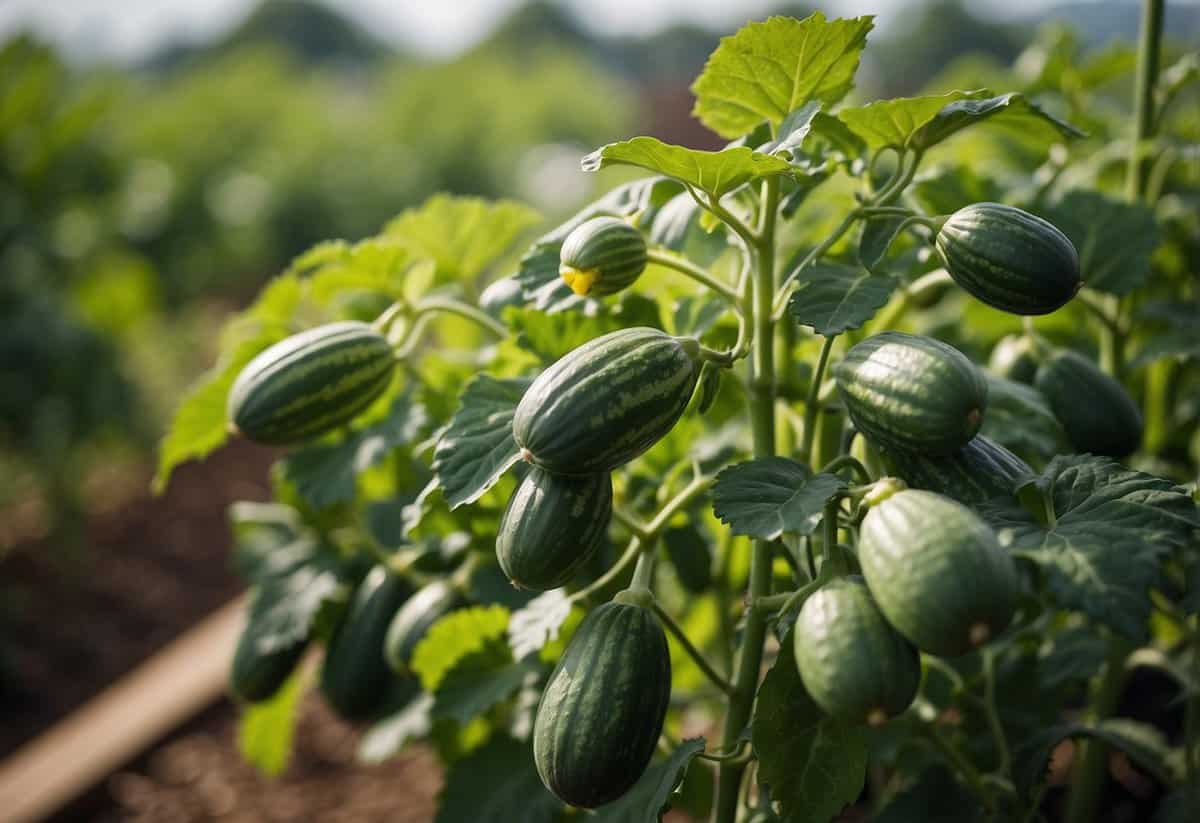
Your cucumber plants will appreciate the extra nutrients, particularly during their flowering stage. Using a liquid tomato feed mixed with water when watering your plants can provide that necessary boost. This practice not only helps cucumbers but can also lead to a bountiful vegetable garden overall.
Gardening effectively means understanding what each plant needs to thrive. By using a feed designed for tomatoes, you’re giving your cucumber plants a better chance to grow strong and produce more fruits. So go ahead, give it a try and see the results in your own garden!
Understanding Soil and Nutrient Basics
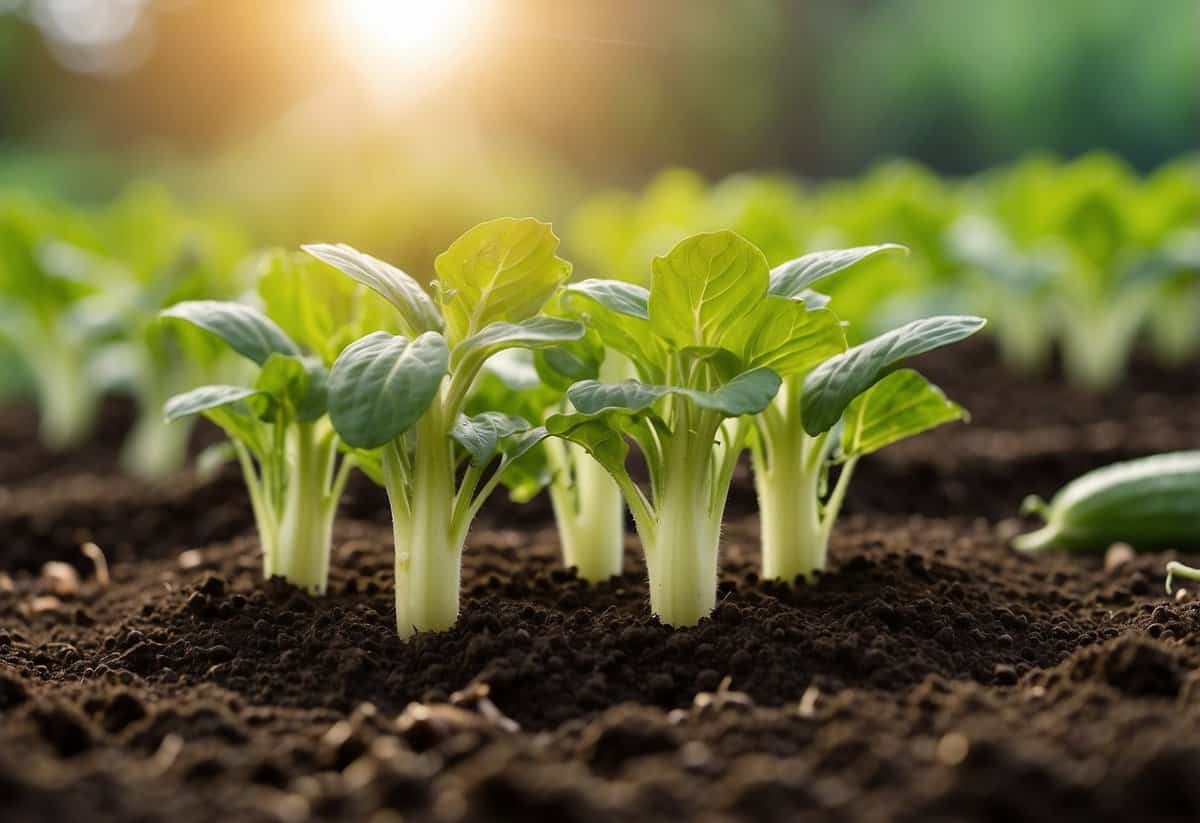
For cucumber plants to thrive, you need to focus on providing the right soil conditions and essential nutrients. This ensures strong plant growth and a bountiful harvest.
Soil Composition and pH Levels
The soil where you plant your cucumbers plays a vital role in their growth. Cucumber plants prefer soil that drains well. It should be loamy, which means a good mix of sand, silt, and clay. Adding organic compost can improve the soil structure and provide essential nutrients.
The pH level of the soil is crucial. Cucumbers grow best in slightly acidic soil with a pH range of 6.0 to 6.8. You can check the soil pH using a simple test kit. If the soil is too acidic or too alkaline, you can adjust it using lime to raise the pH or sulfur to lower it.
Primary Nutrients for Plant Health
Cucumbers need three primary nutrients: nitrogen (N), phosphorus (P), and potassium (K). These are often mentioned as NPK on fertilizer packages. Nitrogen helps in leaf and stem growth. Phosphorus is essential for root development and flower production. Potassium supports overall plant health and fruit formation.
Early in the growing season, a balanced NPK fertilizer, like 10-10-10, is beneficial. Once the plants start flowering, a fertilizer high in potassium, similar to what’s used for tomatoes, can boost fruit production. Regularly applying organic mulch can also help retain soil moisture and add nutrients as it decomposes.
The Specifics of Cucumber Nutrition
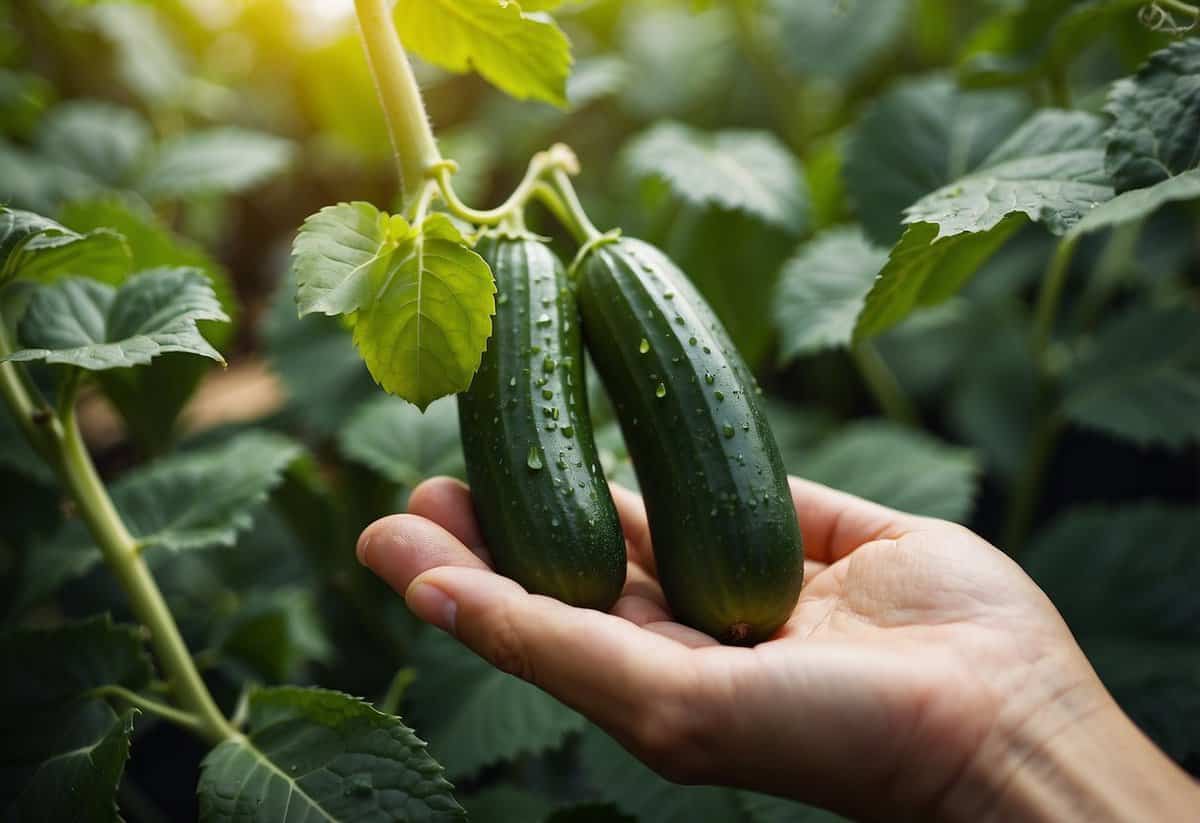
To grow healthy and productive cucumber plants, you need to understand their specific nutritional needs. The right balance of nutrients helps cucumbers thrive, produce flowers, and yield tasty fruits.
Optimal Nutrient Mix for Cucumbers
Cucumbers need a balanced mix of nutrients to grow well. The main nutrients for cucumbers are nitrogen, phosphorus, and potassium, often listed as N-P-K on fertilizer packages. Nitrogen is important for leafy growth, while phosphorus supports root development and flowering. Potassium helps with overall plant health and fruit production.
Besides these macronutrients, cucumbers also benefit from calcium, which helps strengthen cell walls and prevents blossom end rot. Magnesium is essential for photosynthesis, and iron is needed for overall plant vigor.
Using tomato feed can be beneficial because it often has a high content of potassium, which helps boost flower and fruit production. Fertilizers labeled for vegetables are usually suitable for cucumbers too, but be sure to follow the recommended application rates.
The Role of Macronutrients and Micronutrients
Macronutrients like nitrogen, phosphorus, and potassium are crucial in larger amounts. They help with major functions such as growth and fruiting. As your cucumber plants grow, they need more phosphorus to develop strong roots and more potassium to support blooming and fruiting stages.
In addition to macronutrients, cucumbers also need micronutrients. These include calcium, which helps prevent disorders; magnesium, essential for chlorophyll; and iron, vital for both chlorophyll formation and overall plant health. Trace elements such as boron and manganese also play roles, supporting various enzyme functions and development processes.
Organic fertilizers, like compost or manure, can provide a good balance of these macronutrients and micronutrients, enhancing both soil health and cucumber growth. Using natural options like nettle fertilizer or comfrey tea can also supply nitrogen and potassium, helping your cucumbers thrive throughout their growth cycle.
Tomato Feed versus Cucumber Fertilizer
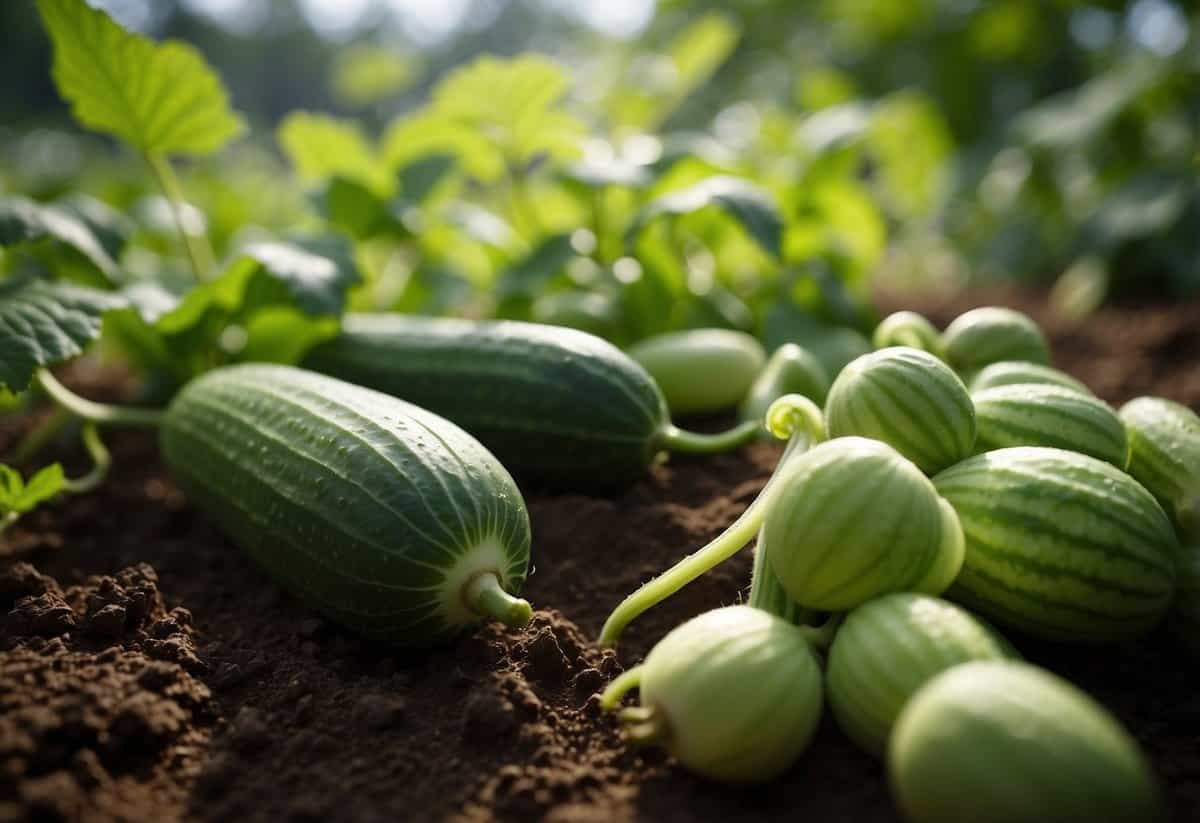
Tomato feed and cucumber fertilizer are both meant to help plants grow. Both feeds have unique nutrient profiles and uses that can impact your garden’s success. Here’s a closer look at how each works and whether they can be used interchangeably.
Comparing Nutrient Profiles
The NPK ratio is crucial for understanding fertilizers. Tomato feed often has a higher potassium content to help tomatoes produce more flowers and fruits. For example, Miracle-Gro tomato feed focuses on a balanced mix of nutrients but leans heavily on potassium.
Cucumber fertilizer tends to have a more balanced ratio like 10-10-10 or 15-15-15, which supports overall plant health, including leaf and stem growth. During early growth, cucumbers need nitrogen for rapid stem and leaf development.
Liquid and granular fertilizers are common for both plants. Cucumber fertilizers might also emphasize organic options like nettle tea. Choosing the right fertilizer depends not just on NPK ratios but also on the stage of plant growth and specific fertilizer type.
Can Tomato Feed Benefit Cucumbers?
Yes, cucumber plants can benefit from using tomato feed, especially during flowering. This is because the high potassium content in tomato feed helps boost flower production, which is also essential for cucumbers.
Using a feed designed for tomatoes during the flowering stage can help cucumbers produce better fruits. For routine feeding, stick to fertilizers meant for cucumbers, particularly those with balanced NPK ratios for overall growth. Liquid tomato feed mixed with water can be a handy alternative.
Before switching entirely to tomato feed, you should monitor your cucumber plants to ensure they get the right nutrients. It can serve as a supplementary feed rather than the primary fertilizer for cucumbers. Combining tomato and cucumber-specific fertilizers can optimize plant health and yield.
Avoiding Common Cucumber Plant Issues
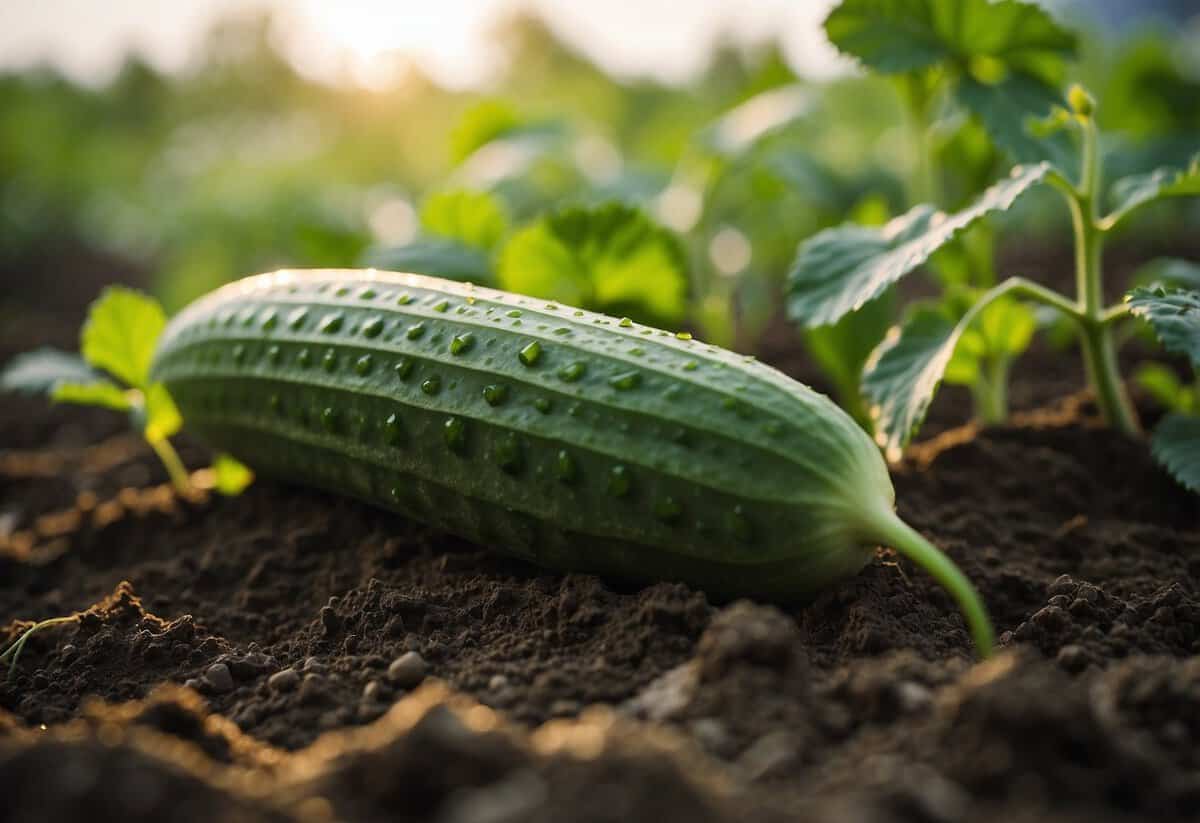
It’s crucial to understand how to keep your cucumber plants healthy by preventing diseases and dealing with pests and nutrient deficiencies. These practices help ensure strong plants and a bountiful harvest.
Disease Prevention Strategies
Your cucumber plants can fall victim to various diseases such as mildew and wilt. To prevent mildew, ensure good air circulation by spacing your plants properly and avoiding overhead watering. Wilt diseases often stem from soilborne pathogens. Use crop rotation and plant resistant varieties to combat this issue.
Maintain well-drained soil enriched with organic matter. This helps roots stay healthy and reduces the risk of disease. Also, practice good sanitation by removing plant debris regularly as it can harbor diseases. These steps are key to disease prevention and ensure your plants thrive.
Dealing with Pests and Nutrient Deficiencies
Cucumber plants can be attacked by pests like aphids and cucumber beetles. Regularly inspect your plants and use natural remedies like neem oil or insecticidal soap to manage these pests. Keeping the garden clean and removing damaged leaves can also help reduce pest problems.
Nutrient deficiencies can cause issues such as yellowing leaves or poor growth. Ensure your soil has enough boron, manganese, iron, calcium, and magnesium. You can add these nutrients through balanced fertilizers or organic compost. Look for specific symptoms like yellowing for iron deficiency or leaf edge browning for magnesium deficiency, and treat accordingly to maintain healthy, strong plants.







